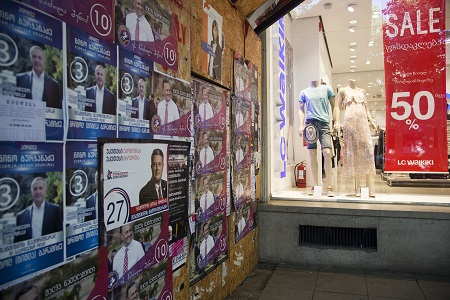More political parties will receive state funding

The number of political parties to receive state funding after last month’s Parliamentary Elections will increase from 11 to 20, which will cost about $4 million (9.8 million GEL) from the state budget annually.
- State funding is available for 'qualified political parties' – referring to parties, which separately or together with others in an electoral bloc, gained more than three percent of votes in the Parliamentary Elections and three percent votes in the local self-Government elections.
- The basic financing for qualified political parties is equivalent to $121,000 (300,000 GEL). However parties can gain more (or less if there are several parties in a bloc) funding based on the number of votes it received in the elections, the number of gained mandates, etc.
- For example if a party gained six percent of votes in the election it will receive $242,000 (600,000 GEL) instead of the $121,000 (300,000 GEL).
- Parties that overcome mandatory thresholds in the elections will also receive one-off financing from the state budget that amounts to no less than $403,252 (one million GEL) to cover pre-election expenses.
- If a party list presented by a qualified election party was gender balanced it can also receive an additional $36,292 (90,000 GEL).
- A qualified political party will retain financing until the next elections.
Despite the fact some political parties failed to gain three percent of votes in last month’s Parliamentary Elections, they still managed to gain the status of 'qualified political party' based on the outcomes of the 2014 self-Government elections. The next local elections will take place next year.
The number of qualified political parties increased after the recent Parliamentary Elections as some parties that gained seats in the legislative body had created blocs with other parties.

Three political parties managed to gain seats in Parliament in last month's Parliamentary Elections. Consequently, their state funding was higher than other qualified political parties. Photo by N.Alavidze/Agenda.ge.
Consequently, parties that were united with the dominant party and occupied seats in Parliament will also receive state funding until the 2020 Parliamentary Elections, at least.
The 20 parties that will receive annual state funding until next year's self-Government or 2020 Parliamentary Elections are:
- Georgian Dream – Democratic Georgia party- $839,000
- United National Movement- $453,000
- Conservative Party- $95,000
- Industrials Party-$216,000
- Republican Party- $95,000
- National Forum- $95,000
- Georgia’s Christian - Conservative party- $241,000
- Free Democrats- $207,000
- Labour Party- $191,000
- European Georgia- $361,000
- Democratic Movement - United Georgia- $97,000
- United Democratic Movement- $402,000
- Alliance of Patriots- $300,000
- Union of Georgian Traditionalists-$35,000
- Free Georgia- $35,000
- Freedom-Zviad Gamsakhurdia’s Way- $35,000
- Georgia’s Armed Forces’ Veterans and Patriots Political Movement- $35,000
- New Christian Democrats- $35,000
- Movement State for People- $79,000
- Civil Platform-New Georgia- $79,000
In last month’s Parliamentary Elections three parties overcame the five percent threshold to gain seats in Parliament; these were Georgian Dream - Democratic Georgia, United National Movement and the Alliance of Patriots.
Prior to the elections the Alliance of Patriots created a bloc with the Traditionalists, Free Georgia, Freedom-Zviad Gamsakhurdia’s Way, Georgia’s Armed Forces Veterans and Patriots Political Movement and New Christian Democrats.
Meanwhile United National Movement created a bloc with European Georgia.
A unity of State for People and New Georgia also gained more than three percent of votes to become 'qualified political subjects' but did not meet the five percent threshold.
Democratic Movement - United Georgia also found itself among the 'qualified political subjects' after the Parliamentary Elections.
 Tweet
Tweet  Share
Share